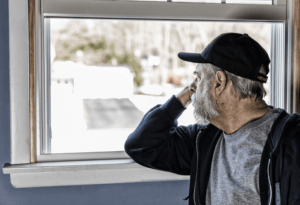
How Can I Increase My VA Anxiety Rating?
Anxiety is a common medical condition, among both the general population and veterans. One recent study showed that 7.9% of veterans screened were suffering from generalized anxiety disorder, and another 22.1% had mild symptoms of anxiety. Here’s what you need to know about getting and maximizing a VA rating for anxiety.
Is Anxiety a Disability?
Anxiety is a mental health condition that can be disabling. Symptoms may include:
- Nervousness or restlessness
- Increased heart rate
- Excessive sweating
- Hyperventilation
- Sleep disturbances
- Trouble focusing
- Gastrointestinal issues
- Having a sense of panic or doom
For some people, these symptoms may be mild or intermittent. But severe anxiety can be debilitating.
Call 1-888-373-4722 or complete a Free Case Evaluation form
Types of Anxiety
The most common type of anxiety is generalized anxiety disorder. However, there are a variety of different types of anxiety that have specific symptoms. Some common examples include social anxiety disorder, agoraphobia and panic disorders. While each of these categories of anxiety has its own diagnostic code, they are all rated under the same schedule.
How Do I Get VA Disability for Anxiety?
To successfully claim VA disability benefits for anxiety, a veteran must first have a current anxiety diagnosis. Then, they will be required to demonstrate that the anxiety is service-connected. This may be accomplished through military service records, medical records, documentation of an incident or setting that triggered the anxiety, and buddy letters from friends, family, and/or fellow service members who can speak to the onset of the anxiety.
You will also need to submit sufficient medical evidence and evidence from people who see the impact anxiety has on your day-to-day life to establish the maximum appropriate disability rating.
Call 1-888-373-4722 or complete a Free Case Evaluation form
How is My Anxiety VA Rating Established?
In addition to the documentation you provide, the VA may ask you to undergo an exam or additional testing. Failure to cooperate with this process could mean your benefits are denied.
A VA rating for anxiety is determined using the General Rating Formula for Mental Disorders. This is the same rating system that is used for most mental health conditions. If a veteran has been diagnosed with more than one mental health disorder–for example, anxiety and depression–the symptoms of all mental health conditions will be considered together to arrive at a single mental health rating.
Currently, the focus in evaluating mental health conditions is on social and occupational functioning. The possible VA rating for anxiety or a combination of mental health conditions are:
| 0% Disability Rating | Diagnosis of anxiety or another mental illness, but symptoms do not interfere with occupational or social function and the veteran does not require continuous medication for the condition. |
| 10% Disability Rating | Mild or intermittent symptoms that impact occupational functioning only during periods of high stress, or the condition is controlled through continuous medication. |
| 30% Disability Rating | Occasional decrease in work efficiency and intermittent periods of inability to perform occupational tasks due to symptoms such as anxiety, depression, occasional panic attacks and chronic sleep disturbance. |
| 50% Disability Rating | Impairment of productivity due to symptoms such as panic attacks more than once a week, flat affect, memory problems, impaired judgment and/or abstract thinking, and difficulty building and maintaining successful workplace and personal relationships. |
| 70% Disability Rating | Occupational and social impairment in most areas, such as work, judgment, mood, and family relationships. This may be characterized by symptoms like near-continuous panic, disorganized thinking, obsessive behaviors and poor impulse control. |
| 100% Disability Rating | Total social and occupational impairment, including symptoms such as impaired thinking and communication, forgetting basic information such as the names of friends and family members, disorientation and intermittent inability to perform daily tasks such as showering and dressing. |
Call 1-888-373-4722 or complete a Free Case Evaluation form
Securing the Highest Possible Anxiety VA Rating
Whether you are just filing a VA disability claim for anxiety or looking to increase your disability rating, the types of evidence required are similar. An experienced veterans benefits advocate can be the best source of information about how to submit the strongest possible claim in your case.
Generally, the key information will be medical documentation and statements from you and others in your life who observe the impact anxiety has on you.
One problem many veterans filing claims for anxiety and other mental health issues have is that they have delayed getting treatment for the condition or have been sporadic in seeing their medical provider. That means medical records are sparse and may not fully support the degree of impairment the veteran is suffering. If you are considering filing a VA disability claim and haven’t created a consistent record with your medical provider, you should start working on that as soon as possible.
The other way to establish the extent of your symptoms is through your own statement and the use of buddy letters. Note, though, that this is a supplement to and not a substitute for medical documentation. Your disability benefits advocate can help you determine who in your life might have valuable information to add.
Increasing Your VA Disability Rating for Anxiety
While anxiety is assessed under the same rating schedule as many other mental health disorders, it is unlikely that anxiety alone will result in a high VA disability rating. However, there may be ways to increase your overall disability rating.
For example:
- Presenting evidence that your condition is worse than originally assessed or has worsened over time,
- Adding another service-connected mental health condition to your claim, which may increase the impact of symptoms on your social and occupational functioning-it is common for people to suffer from more than one mental health condition, such as anxiety and depression
- Seeking a disability rating for a separate service-connected or secondary-connected condition
Get Help With Your Claim for VA Disability for Anxiety
The experienced advocates at Disabled Vets have extensive knowledge of how the VA arrives at disability ratings, and of the claims and appeals processes. No matter where you are in the process, a knowledgeable veterans disability benefits advocate can help. Call us today at 888-373-4722 or fill out our contact form here.
Learn More Here:
- How To Apply For VA Disability
- My VA Disability Claim Was Denied What Should I Do?
- How To File A VA Disability Claim
- VA Disability Ratings
- Mental Disorders and VA Disability
- Most Common VA Claim Types
Call 1-888-373-4722 or complete a Free Case Evaluation form







